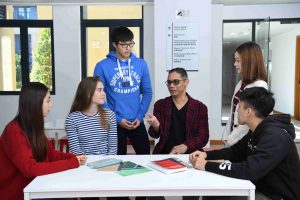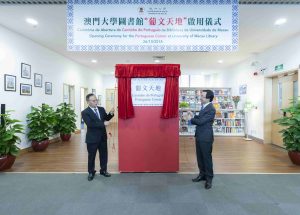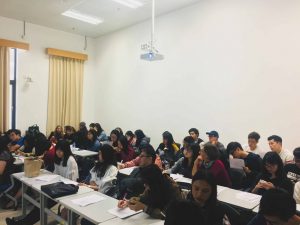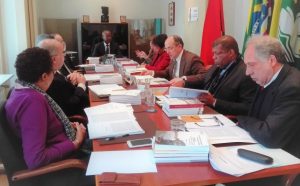Language differences need not be a barrier to cross-cultural communication, as long as we have competent bilingual professionals. For centuries, Chinese-Portuguese bilingual professionals have made cross-cultural communication in Macao possible. Today, they are taking on a new role: facilitating communication and collaboration between China and Portuguese-speaking countries. Indeed, the importance of training Chinese-Portuguese bilingual professionals was elevated to a strategic height during State Council Premier Li Keqiang’s 2016 visit to Macao, when Li announced the central government’s decision to support Macao to become a training base in this area. Besides meeting the needs of the fast-developing Macao and facilitating China’s collaboration with Portuguese-speaking countries, building Macao into a bilingual training base is also crucial for the sustainable development of the Greater Bay Area. In recent years, the University of Macau (UM) has spared no effort to strengthen its Portuguese language education and the training of bilingual professionals, with numerous measures being launched to this end.
Reforming Curriculum to Train Outstanding Language Professionals
The faculty members in the Department of Portuguese at UM come from diverse backgrounds. Some are professors from Portuguese-speaking countries like Portugal and Brazil, while some are scholars known for their studies on teaching Portuguese as a second language. The department offers programmes at all levels, including a Bachelor of Arts in Portuguese Studies programme, a Master of Arts in Portuguese Language and Intercultural Studies programme, a Master of Arts in Translation Studies (Portuguese-Chinese) programme, a PhD in Applied Linguistics (Portuguese) programme, and a PhD in Literary and Intercultural Studies (Portuguese) programme. Rector Yonghua Song says, ‘We are well aware of the great responsibility on our shoulders, and we still have a long way to go. ’ Rector Song points out that the department is in the process of implementing several reform measures, including reforming the undergraduate curriculum, providing special scholarships, increasing the duration of overseas studies for undergraduate students, offering more courses for postgraduate programmes, and recruiting more international students.
Apart from the Department of Portuguese, the Faculty of Law is also tasked with training bilingual professionals. In the 2014/2015 academic year, the faculty launched a five-year Bachelor of Law (Chinese and Portuguese Language) programme, particularly targeted at students whose native tongue is Chinese. The first cohort of students enrolled in the programme is expected to graduate next year. So far, 110 students have had the chance to study Portuguese at a Portuguese university through this programme. In the 2017/2018 academic year, the faculty raised the requirements for Portuguese proficiency for this programme.
Establishing a Centre to Improve Bilingual Teaching
Prof Yao Jingming, head of the Department of Portuguese, says that over the years the department has produced a large number of bilingual professionals for Macao and mainland China, but there are greater goals to accomplish in the future. In May 2017, the department established the Chinese-Portuguese Bilingual Teaching and Training Centre (CPBTTC), which has since organised various workshops, short courses, and lectures, including workshops on Portuguese literature, interpreting, and Portuguese dialects; a short course in legal translation; and celebrity lecture series. The centre has also invited scholars from outside Macao to give lectures. For instance, in April this year, Prof Helena Buescu from the University of Lisbon was invited to give a series of lectures and short courses on the topic ‘literary landscape and painting’. In addition to training language professionals, the centre is also committed to producing bilingual professionals for non-language areas. For instance, in April this year, the centre invited Prof Ye Zhiliang from Beijing Foreign Studies University, who is also a visiting scholar at UM, to give a training course in business Portuguese, which was very well received. Last year, UM and the Macao Foundation jointly established the Chinese-Portuguese Literary Translation Award and held the first award ceremony in Macao in September this year. The Department of Portuguese and the Foreign Language Teaching and Research Press in Beijing have started collaboration in the production of a series of books translated from classics in Chinese and Portuguese. The department has also started collaborating with the University of Lisbon’s Faculty of Arts on a Chinese literature translation project. Both projects involve the participation of master’s and PhD students from the department.
Hong Gang Jin, dean of the Faculty of Arts and Humanities, says, ‘The CPBTTC will continue to think outside the box and improve the mode of teaching by taking into account the characteristics of Chinese students. There are 230 million Portuguese-speaking people distributed across four continents. We want to help our students develop the language skills that will allow them to communicate confidently with these Portuguese speakers.’ She says that the centre will tap into the Portuguese department’s strength in academic research to complete several projects. The first is to systematically carry out research studies on Portuguese language education and Sino-Portuguese cultures. The second is to establish a reference framework for Chinese learners of the Portuguese language and a related database. The third is to provide training for Portuguese language instructors in Macao and mainland China. The fourth is to compile Portuguese language teaching material.
Creating the Right Environment to Promote Portuguese Teaching and Research
This year, UM has held many academic events to stimulate interest in bilingual learning. In May, the Department of Portuguese held an international conference on Portuguese linguistics, literature and translation, which attracted experts from Portugal, Brazil, Mozambique, France, Italy, mainland China, Hong Kong, and Macao. At the conference, participants exchanged ideas on teaching and learning Portuguese as a second language. In September, the department held a forum on translation between Chinese and Portuguese, which included a round table meeting, a seminar, and a translation workshop. The forum aimed to raise awareness about the important of Portuguese language education among tertiary institutions in China that offer Portuguese language programmes.
In October this year, the department established a Portuguese Corner in collaboration with the UM library. In the Portuguese Corner there is an audio-visual room and a study room that serve as a learning commons for Portuguese studies, teaching, and research. Apart from providing information on Portuguese culture, the corner also holds lectures and exhibitions on a regular basis. Looking ahead, Rector Song says, ‘I believe that with our strong faculty team and excellent learning facilities, we will see an increase in both the quantity and the quality of Chinese-Portuguese bilingual language professionals graduating from our university, and they will be able to play a positive role in facilitating communication between Portuguese-speaking countries on the one hand, and Macao and mainland China on the other.’
More related articles:
UM Strives to Attain More Achievements in Scientific Research to Meet President Xi’s Expectations
UM Attracts and Retains Talented People to Support the Development of the Greater Bay Area
The Greater Bay Area Through UM Students’ Eyes
Source: Communications Office
Media Contact Information:Communications Office, University of Macau
Albee Lei Tel:(853) 88228004Kelvin U Tel:(853) 88224322Email:prs.media@um.edu.moUM Website:www.um.edu.mo





